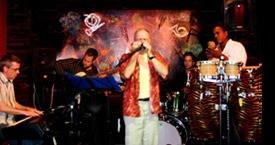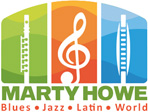
Latin Jazz on Flute and Chromatic Harmonica
The flute is considered a major instrument in Latin Jazz, and has it’s roots in the Afro-Latin Orquestas Tipicas (now called Charangas) from as early as 1900. I was first inspired by Ian Anderson (of Jethro Tull), who gave credit to jazz master Rahsaan Rolland Kirk, and then onto Herbie Mann and Dave Valentin. But when I visited Cuba, my ears were really opened discovering the authentic latin flute stylings that have emerged through 100 years of nurturing.
The chromatic harmonica has played a part of Brazil’s Bossa Nova birth in the 50’s, through the amazing talent of Mauricio Einhorn. Of course anyone who has heard Toots Thieleman’s Brazil Project 1 & 2, knows that the chromatic and acoustic bossa rhythms are a heavenly match.
Manhã de Carnaval (Black Orpheus)
Josué Tacoronte (Guitar – Cuba), Paul Pigat (Guitar – Vancouver BC), Michael Rush (Bass – Vancouver BC), and Marty Howe (Harmonica – Nanaimo BC)
“Manhã de Carnaval” (“Carnival Morning”) is a song by Brazilian composer Luiz Bonfá and lyricist Antônio Maria.
Una Manyana
Marty Howe – flute, Marty Steele – keys, and Smarty (James) McRae on drums.
Una Manyana (Morning) is a beautiful Latin Jazz standard (Afro-Cuban) written by Clare Fischer (1965).
Black Orpheus
Marty Howe, chromatic harmonica, with THE MARTYS playing a beautiful Bossa tune (and jazz standard) known as Black Orpheus (Luiz Bonfa). Also known as “Manhã de Carnival, and “A Day in the Life of a Fool”.
“Manhã de Carnaval”‘ became one of the first Bossa Nova compositions to gain popularity outside Brazil. It is one of the most important Brazilian Jazz/Bossa songs that established the Bossa Nova movement in the late 1950s.
O Meu Amor Chorou (Cry of Love)
Marty Howe Latin Jazz Quartet. Marty Howe – flute, Darcy Phillips – keys, Humberto Mandoza – congas, Anatol McGinus – bass.
I first heard this tune on “Brazil: Once Again” an album by jazz flautist Herbie Mann recorded in 1977 . Herbie was a pioneer in jazz/Latin fusion on the flute. Original melody composed by Brazil’s Paulo Diniz.
Besame Mucho – Marty Howe Latin Jazz Quartet
Marty Howe – chromatic harmonica. Darcy Philips – Keys, Humberto Mandoza – congas, Anatol McGinus – BassBésame Mucho (“Kiss me a lot”) is a Latin standard written in 1940 by Mexican songwriter Consuelo Velázquez. It is one of the most famous Boleros, sung and recorded Mexican song in the world.
